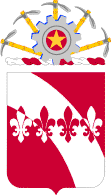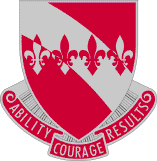35th Engineer Battalion, US Army: Difference between revisions
Knorrepoes (talk | contribs) m (Text replacement - "{| class="wikitable"↵|+Official blazon↵|-↵|'''English''' ↵| (wanted)↵|}" to "{| class="wikitable" |+Official blazon |- |'''English''' | blazon wanted |}") |
Knorrepoes (talk | contribs) m (Text replacement - "|Arms of {{PAGENAME}}]]" to "|Coat of arms (crest) of {{PAGENAME}}]]") Tags: Mobile edit Mobile web edit |
||
| Line 3: | Line 3: | ||
{|align="center" | {|align="center" | ||
|align="center"|[[File:{{PAGENAME}}.png|center|350 px| | |align="center"|[[File:{{PAGENAME}}.png|center|350 px|Coat of arms (crest) of {{PAGENAME}}]]<br> (Coat of Arms) | ||
|align="center"|[[File:{{PAGENAME}}dui.png|center|350 px| | |align="center"|[[File:{{PAGENAME}}dui.png|center|350 px|Coat of arms (crest) of {{PAGENAME}}]]<br> (Distinctive Unit Insignia) | ||
|} | |} | ||
Revision as of 11:57, 20 August 2023
35TH ENGINEER BATTALION, US ARMY
(Coat of Arms) |
(Distinctive Unit Insignia) |
| English | blazon wanted |
Origin/meaning
Scarlet and white are the colors for the Corps of Engineers. The arched bend, representing a road, symbolizes an outstanding accomplishment of the organization - participation in the construction of the Alcan Highway. The four fleurs-de-lis represent the World War II service in Europe. Crest: Scarlet and white are traditionally used by Engineer units. The gear and pickaxes symbolize the traditional Engineer mission; the five pickaxes and eleven gear cogs denote the decorations awarded to the battalion for participation in World War II and Vietnam. The bamboo handles and torteau with star signify the unit's service in Vietnam.
The coat of arms was originally approved on 18 April 1952. It was amended on 24 February 1999 to include a crest for the 35th Engineer Battalion. The distinctive unit insignia was approved on 18 April 1952.
Literature: Images from Wikimedia Commons

